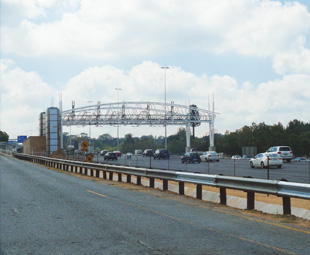All systems go for controversial tolls?

When it’s frowns and fists rather than vuvuzelas and brightly-painted faces that are uniting us, you have to wonder how the controversial e-tolling system is going to leave us as a nation
The introduction of e-tolling to fund the multi-million-rand Gauteng Freeway Improvement Project – currently scheduled to go live on April 30, 2012 – has split the nation in two. It’s us and them; the people versus the government.
We all love beautiful roads and, from an economic and safety point of view, we need them. And government has acknowledged that the whole matter should have been handled better. It’s basically a fine mess we’ve gotten ourselves into, and it’s clear that some form of compromise is necessary. Just who is going to be doing the compromising is as yet undecided – but big things happen when South Africans unite.
Let’s get to the crux of the matter. On the one side we have the South African National Roads Agency (SANRAL), which manages South Africa’s national road network and is responsible for the controversial e-tolling system, whereby special gantries have been built by government. Each time a vehicle passes under a gantry, a toll fee is charged – with the amount determined by the distance each gantry represents.
How does it work? SANRAL contracted Austrian company Kapsch TrafficCom to build and maintain the gantries. According to SANRAL: “These gantries will be fitted with the toll collection equipment that will recognise the vehicle identifier (electronic transponder or e-tag) in a vehicle and/or the vehicle number plate; the toll will be deducted from a user’s registered e-toll account associated with the vehicle identifier; and the user will be able to travel without any disruption.”
Overhead cameras will photograph a vehicle’s front and rear number plates as part of the registered-user verification process, and to bill those who don’t have an e-tag (non-registered users will be sent a bill with the due date of payment).
Where does someone register an account and get the e-tag? Road users have various options – the SANRAL website, the e-toll call centre, retail outlets and e-tolling kiosks located at various malls in Gauteng.
The e-tag will not cost anything, but a minimum amount, still to be determined, must be loaded into the account. The e-tags do not expire. Registrations began in the second quarter of 2011.
Many discount options are available:
* Period discounts: also known as time-of-day discounts, these will be applicable to all vehicles;
* Public transport discount: a 50 percent discount will apply to all public transport vehicles that have registered e-tag accounts; and
* Frequent-user discount: applicable only to light vehicles and registered e-tag account holders.
Why are the tolls necessary? SANRAL says tolling is important because it enables them to provide new and improved roads sooner than it would be able to using traditional tax-based revenues which usually fund this type of activity. SANRAL says tolling ensures dedicated funding for road maintenance.
We know we need to fund roads, but why isn’t government paying for this? The government simply doesn’t have enough money to upgrade the road network. SANRAL says that because only 20 percent of its roads are tolled, it has had to borrow money. The government is R20 million in debt because of the upgrade of 180 km of freeway in Gauteng.
Tolling is not a new practice. It’s been around since the times when a gatekeeper would turn the pike to allow access to travellers only once they had paid the toll. Tolling has been used internationally to fund road projects since the early days of automotive travel.
Why aren’t our taxes being used for this? A toll is not a tax. A better understanding is to say that it is a user fee. A road user can choose to pay the toll: if they want to use a section of road that has a gantry, they must pay to do so. SANRAL does concede that customers of toll facilities also pay taxes, but says these levies are used to fund non-toll roads and stresses that: “Taxes are not used to fund toll roads.”
The Democratic Alliance (DA) took SANRAL and the Department of Transport to court in order to block the implementation of tolling on the R300, N1 and N2 in the Western Cape. The City of Cape Town and the Western Cape Province both put their voices behind the tolls not being implemented. This made government waver on its decision to implement tolling on the winelands route.
COSATU, South Africa’s largest trade union, has been in talks with the ruling ANC over its plans to implement e-tolling in Gauteng. After the massive protest against e-tolling and labour broking in March, and the widespread refusal of road users to register for an e-tag, the government has no choice but to talk to COSATU.
SANRAL chief executive Nazir Alli says more than 320 000 vehicles have so far been registered – and government says the implementation of e-tolling will go ahead. With just about everybody against the controversial plan, it remains to be seen whether it will.
Published by
Focus on Transport
focusmagsa



